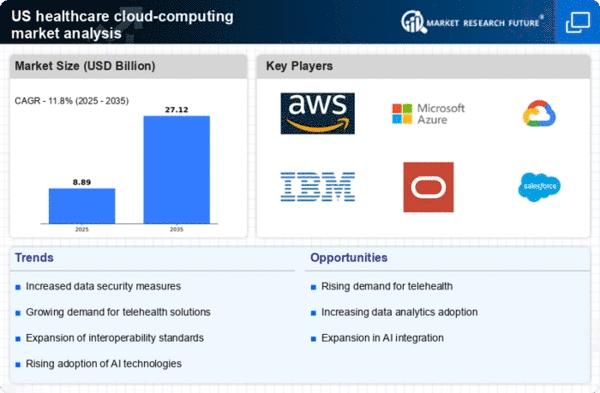Interoperability and Data Integration
Interoperability is increasingly recognized as a vital driver in the healthcare cloud-computing market. The ability to integrate various healthcare systems and share data seamlessly is essential for improving patient care and operational efficiency. Cloud-based solutions facilitate interoperability by providing a unified platform for data exchange among different healthcare providers. This integration allows for comprehensive patient records, enhancing care coordination and reducing the likelihood of errors. As healthcare organizations strive to create a more connected ecosystem, the demand for interoperable cloud solutions is likely to grow, contributing to the expansion of the healthcare cloud-computing market.
Cost Efficiency and Resource Optimization
Cost efficiency remains a critical driver in the healthcare cloud-computing market. Organizations are increasingly adopting cloud solutions to reduce operational expenses associated with traditional IT infrastructure. By migrating to cloud-based systems, healthcare providers can minimize costs related to hardware maintenance, software updates, and data storage. A study indicates that healthcare organizations can save up to 30% on IT costs by utilizing cloud services. Additionally, cloud computing allows for better resource allocation, enabling healthcare facilities to focus on patient care rather than IT management. This shift not only enhances operational efficiency but also contributes to improved patient outcomes, making the healthcare cloud-computing market an attractive option for many providers.
Regulatory Compliance and Data Management
Regulatory compliance is a significant factor influencing the healthcare cloud-computing market. With stringent regulations such as HIPAA in place, healthcare organizations must ensure that their data management practices adhere to legal standards. Cloud solutions offer advanced security features and compliance tools that help organizations manage sensitive patient information effectively. The ability to maintain compliance while leveraging cloud technology is crucial, as non-compliance can result in hefty fines and reputational damage. As the regulatory landscape continues to evolve, the demand for compliant cloud solutions is expected to rise, further propelling the growth of the healthcare cloud-computing market.
Rising Demand for Remote Patient Monitoring
the healthcare cloud-computing market is experiencing a notable surge in demand for remote patient monitoring solutions.. This trend is driven by the increasing prevalence of chronic diseases, which necessitate continuous health tracking. According to recent data, approximately 60% of adults in the US manage at least one chronic condition, leading healthcare providers to seek efficient ways to monitor patients remotely. Cloud-based platforms facilitate real-time data collection and analysis, enabling healthcare professionals to make informed decisions. Furthermore, the convenience of remote monitoring enhances patient engagement and adherence to treatment plans. As a result, the healthcare cloud-computing market is likely to expand significantly, with projections indicating a growth rate of around 20% annually over the next five years.
Advancements in Analytics and Decision Support
Advancements in analytics capabilities are transforming the healthcare cloud-computing market. The integration of sophisticated data analytics tools enables healthcare providers to derive actionable insights from vast amounts of patient data. These insights can inform clinical decision-making, improve patient outcomes, and optimize resource utilization. The market for healthcare analytics is projected to reach $50 billion by 2027, indicating a robust growth trajectory. As organizations increasingly recognize the value of data-driven decision-making, the demand for cloud-based analytics solutions is expected to rise, further driving the healthcare cloud-computing market.
















